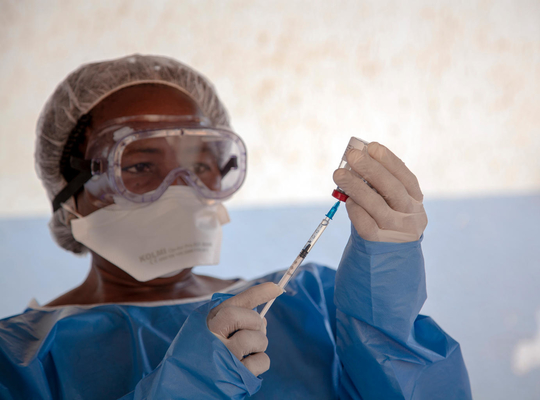A new analysis of a 2017 Ebola outbreak in the Democratic Republic of the Congo (DRC) that occurred in a remote location and was limited to 16 cases involved a novel variant of the virus and was probably triggered single spillover, according to a new study.
In other Ebola developments, World Health Organization (WHO) vaccine advisors this week recommended that lactating women and babies older than 6 months be included in the Ebola ring vaccination campaign, and the DRC's health ministry today reported 10 more cases.
Bushmeat likely source of 2017 outbreak
The outbreak covered in the new study was the DRC's eighth and occurred in the remote Likati district of Bas Uele province in the northern part of the country. An international team of researchers from the DRC, Canada, Doctors Without Borders, and the WHO published its findings yesterday in the Journal of Infectious Diseases.
The outbreak began in late March of 2017, totaling eight cases, five lab-confirmed and three probable. Four people died from their infections.
The event was limited to a single transmission chain—two family members of the index patient probably contracted the virus while transporting the man to and from a traditional healer and health facilities. The secondary cases passed the disease to five more people.
The investigators concluded that the index patient was exposed to Ebola through close contact with bush meat when he butchered a wild boar. Also, there was a nonhuman primate brought to and sold at the local market.
Genetic analysis revealed a novel Ebola Zaire virus variant that was closely related to the initial Mayinga variant isolated in the DRC in 1976 and 1977.
The researchers also noted several notable factors that, besides the remote location, likely limited the scope of the outbreak. For example, a local nurse who was part of local training on rapidly identifying Ebola cases in 2016 first raised the alert. Also, because of unusual death circumstances and similar cases in a close community, the deceased patient's relative implemented an ad hoc protected burial, which included decontaminating some personal belongings.
The team said the examples highlight the importance of healthcare training and sensitization of local communities in areas where outbreaks are likely to happen. Also, they noted that the genetic findings show how stable Ebola is in the environment over many decades, highlighting the importance of understanding filovirus evolution and selection pressures involved in promoting the jump of specific variants to humans.
Vaccine for lactating women, babies
The recommendation on including lactating women and infants older than 6 months in Ebola vaccination campaign came from the WHO's Strategic Advisory Group of Experts (SAGE) on Immunization, which met in Geneva this week.
At a media telebriefing today marking the close of the meeting, Kate O'Brien, MD, MPH, who directs the WHO's department of immunization, vaccines, and biologicals, said the group was briefed on the vaccine's role in decreasing the magnitude of the outbreak.
In February, the DRC announced plans to include pregnant and lactating women in the vaccine protocol, and SAGE in an interim recommendation endorsed the action.
Alejandro Cravioto, MD, who chairs the WHO's SAGE group, said the action this week endorses an earlier decision made by the DRC health ministry's ethics committee to include pregnant and lactating women and babies younger than 1 year old in the ring vaccination campaign. He noted that infants are especially prone to Ebola infection.
Deaths top 700
The 10 new infections in the DRC today are part of an ongoing surge in activity that followed violence in late February against Ebola treatment centers in Katwa in Butembo.
Three are in Katwa, one of the main hot spots, and two are in Beni, the earlier main epicenter that is experiencing a new rise in cases. Five locations each have a single new case: Vuhovi, Mandima, Butembo, Kalunguta, and Mabalako.
The cases lift the outbreak total to 1,117, and health officials are still investigating 295 suspected cases.
Seven more people died from Ebola, including 5 in community settings, an occurrence that raises the risk of virus spread. The DRC's fatality count has now reached 702.
See also:
Apr 3 J Infect Dis abstract
Feb 20 CIDRAP News story "Ebola vaccine to be given to pregnant, lactating women"
Apr 5 DRC update

















